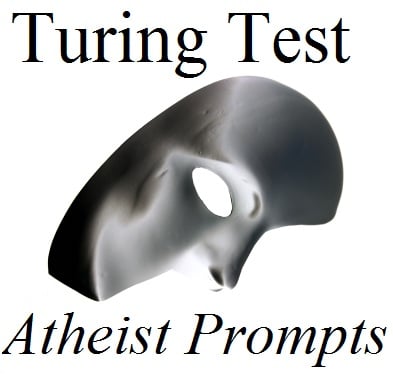This is the first entry in the Atheist round of the 2013 Ideological Turing Test. This year, atheists and Christians responded to questions about sex, death, and literature.
Polyamory
It seems to me that the purpose of civil marriage is not to tell people who they should be in a relationship with, but rather to grant legal recognition and rights to the people who are in fact in relationships. As such, the question is not “should more than two people be allowed to form a marriage?” but rather “do more than two people want to form a marriage?”
The answer, in most cases, is no.
Some days, it’s as much as my wife and I can do to stay married to each other. I can’t imagine trying to negotiate a relationship between more than two people with career and personal needs and aspirations to balance. I find it hard to imagine that anyone wants group marriages other than a few hippies and some fundamentalist Mormons and Muslims.
However, in a free society, we don’t ban something simply because the majority of people don’t want it. Indeed, whether we can call ourselves a free society is best measured by how we treat our minorities. If anything, the fact that so few people would want to engage in polyamorous relationships is all the more reason to recognize them where they do exist. It’s certainly not going to make my marriage stronger to keep some committed group of three or four consenting adults in a long term relationship from having legal recognition and the ability to visit each other in the hospital and have community property together. I don’t want that kind of relationship, and so whether the people who do want it are recognized really doesn’t affect me at all. One of the lingering effects of puritanism in our society is that so many people think that their existences will somehow suffer if people who are not like them are allowed to live in peace.
Now, I do see certain concerns from a women’s rights perspective, in that realistically many of the people taking advantage of the recognition of polygamous relationships might be members of fundamentalist religious sects who tend to treat women and children badly. That’s a serious concern, and I think it’s probably the best argument that people bring against recognizing these relationships. However, it’s important to remember that we already have laws against child abuse and spousal abuse. Far more women and children are abused by men in “traditional” marriages than by members of plural marriages. Moreover, it’s arguable that it’s being forced to live in the shadows outside the law that makes it so easy for these families to treat their members badly. If they are recognized in terms of their family relationship and come out of hiding, it’s that much easier for women and children in these families to come to the authorities if they are experiencing abuse. Finally, making it easier for religious fundamentalists who believe in polygamy to integrate with mainstream society is probably the most powerful weapon we have against the sexism and child abuse so common in those circles. If they stop living on the margins and start sending their kids to public school, surfing the internet, going to mainstream doctors, etc. just like any other family, they are that much more likely to come in contact with the opportunities and technologies of modern society which, I firmly believe, tend strongly towards instilling in people a desire for freedom both from patriarchy and superstition.
Euthanasia
If it’s never permissible to end a life, then why exactly do we all die? If there’s one thing we can say for certain, it’s that life is a 100% fatal condition.
Look, I don’t mean to be flip. But if there’s one thing that is utterly and completely our own, it’s our lives. That’s why it is always wrong for someone to take another person’s life against their will. But it’s also why it’s frankly kind of offensive to claim that I don’t have the right to end my life if I choose to.
A person doesn’t give their consent to be born. They don’t sign a contract committing to remain alive until some outside force chooses the time of their death. So why would we not have the right to choose when to end our own lives? To force someone to remain alive against their will would be a form of slavery.
Now, let’s be clear: There are certainly a lot of situations in which someone who expresses a desire to die is not actually doing so freely, but rather under the influence of depression or emotional coercion. For the same reason that I think it’s essential that our right to end our lives how we choose and when we choose be respected, I think it’s also important that if there’s a reason to think that someone is seeking to end their life due to depression or outside pressure, we provide them with counseling.
However, there are times when it’s completely rational to choose a dignified end to life rather than seeking to get every last minute of suffering. I’ve seen many articles in which it’s stated that doctors would prefer not to end life in an ICU surrounded by a bunch of other doctors and nurses trying to revive them. And that’s hardly surprising. What kind of quality of life is that? What kind of sick worldview would hold that we’re required to suffer as much as possible rather than slipping quietly away in a morphine fog when it’s clear that there’s nothing left but pain and increasingly desperate medical procedures?
And if we have the right to end our lives when we choose, it’s simply a matter of justice that those who through disability aren’t able to do so themselves have a physician’s help.
Bonus
I think the genre which would best express my worldview is the coming of age novel.
The novel is the quintessential modern literary form. The narrative structure allows a focus on psychology which allows deeper insight into the human experience. It allows for complex plot and for multiple viewpoints.
The coming of age novel in particular deals with what I think is the key human experience: that point when we realize that there is nothing magical about adults. In some says, I’d say that religious experience is rooted in a refusal to ever quite accept that there are no “adults” out there operating on a higher plane and looking after us.
There’s a scene in Annie Dillard’s An American Childhood which crystalized for me the pretense behind religion. The main character is sitting in her church service and it suddenly becomes very plain to her that there’s simply nothing going on there. The same realization came to me much more gradually, but when I read Dillard’s book in high school I thought it summed up the liberation of realizing that there’s no god tip-toeing through the room when people close their eyes and pray.
Perhaps the book I’ve read most times in my life is Ender’s Game, another coming of age novel, and while Card himself seems intent on bringing in religious topics (he’s Mormon) I always drew a lot from the way in which Ender realizes that the adults are not guardians of goodness. And it’s especially key that it’s empathy that allows him to understand the “Buggers” in a way in which the adults in his life are incapable.
One set of books that I found myself unable to love, even though I read a lot of fantasy, was the Narnia books, and I think one of the reasons is that Lewis never really lets his characters grow up. They have to remain children in relation to his god-stand-in, Aslan. The only character who does clearly grow up is Susan, whom Lewis condemns.
You can vote on whether you think these answers were written by a Christian or an Atheist here. Comments are open to discuss the substance of the post and for speculation about the true beliefs of the author, so please vote before looking at the comments.













